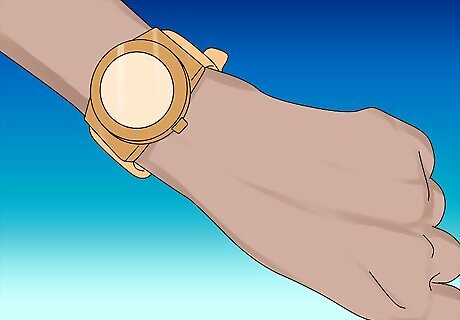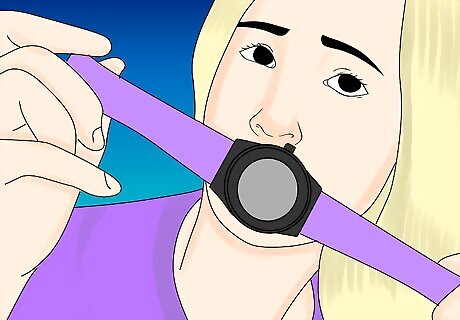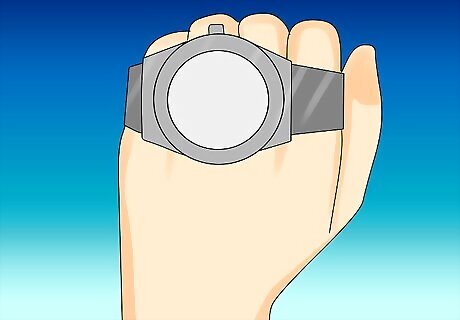
views
Have you got a watch worth reselling?

Be realistic. There is no point trying to get a good price on a watch you only paid $50.00 for. Watches made to last a short time, from cheap plastic, with gimmicks on them or using fake designer labels are not worth your effort in trying to sell them, at least not for a decent return. On the other hand, an expensive Swiss watch made of metal, with fine workings, from a reputable designer brand and targeted at the luxury market, may well be worth your time selling. The watch should be currently desirable, one of the sought-after brands. For some people, this means only Swiss, but for others, it generally means high-end brands or specific editions. A list of watches that appear to hold their resale value is found at the end of this article. This is not to say you can't sell a cheap watch; it simply means you need to expect next-to-nothing for it and sell it through a method that won't chew up the sale in commission and opportunity cost.

Understand which features tend to attach to watches with good resale value. There are some features that those in the watch resale industry consider help ensure that the watch keeps sufficient value for resale. The watch is made from stainless steel Complexity of the watch; it will be worth more if it took many months to create by hand Conservative - it has hours, minutes, seconds and date; no other features (too faddish, too garish and the watch is less likely to hold its value well) It is of an average size (although this depends on the trends of the time and brand influence) It uses automatic Swiss movement The brand is recognizable and sells well when new The watch is rarer than other watches; if it was sold in limited supply or as a limited edition (perhaps for an anniversary celebration of the watchmaker), it will often be more attractive as a resale item (but see "conservative" above).

Consider the condition of the watch. Even if your watch is desirable, is it in good shape? Some things to consider include: The watch should be in very good condition, close to as good as new if possible. Get a professional clean from an expert if it needs a clean and polish up; do not attempt this yourself in case you devalue the watch. The watch should be in working condition. If not, can you get it fixed and still make it a worthwhile sale? Be aware that replacement pieces can immediately devalue its worth. The watch should be original. As noted, replacement pieces can alter the value, as can aftermarket add-ons. Does the watch come with its original packaging and perhaps even with the sales receipt? These "peripheral" items can increase the value because they help to authenticate both the source and the original purchase price. Plus, some people like to have the original packaging if it was well made.
Valuing the watch

Find out how much your quality watch is worth. Be aware that the after-market price will be very different from the profit-inclusive retail price. In most cases your watch will be worth quite a lot less than what you paid for it. However, in some cases, it may have increased in value due to its rarity, collectible status, or in some cases, because it was owned by someone famous, notorious or noteworthy.

Do an online search to determine the current value of the watch. You can find out through various sources whether or not the watch has value. Begin with the brand's own website and retailer sites, to see whether the watch in question is still being sold and for what price. Most useful of all, especially for older, vintage watches, are the auction sites. If you find watches of the same brand, style and date selling on these sites, you will get a good idea of current market value (what buyers are likely to pay for it). Be sure to do a comparison with quite a few different sellers and auctions sites, just in case nobody is buying and the sellers are just valuing off each other! Additional research can be done by checking out books about watches from the library or online ebook sources. Look for information about what makes your watch unique and desirable (or what it lacks by way of those essentials).

Find out what the aftermarket prices for watches identical to or as much like yours as possible. If you start veering too far away from the age, style and condition of your watch, your appraisal won't be realistic. It must be like-with-like unless you know something about the watch that sets it apart, such as a famous actor or singer having once owned it (in which case you'll need proof). Be aware that even within the same range of watches, some may have been made better than others, in order to capture two different price markets. Always be sure of which one you have before assuming it is worth a good amount.

Move beyond your own research and analysis of the watch's value. Get a professional appraisal and be sure to obtain a certificate from the appraiser. Knowing the exact value of your watch is the best way to get as much money as possible for it.

If you consider it's worth the effort to sell your watch, move to the selling stage, discussed next.
Selling the watch

Find a buyer. The best way to sell a watch will depend on its value and whether you're happy to sell it direct or you'd rather sell through someone. Selling direct requires more effort on your behalf but you will likely get more for the sale, as selling through someone else usually entails a high commission.

Sell direct. There are various ways that you can do this, including: Consider whether anyone you know has expressed an interest in your watch before. This might be a friend, a family member or a coworker. Of course, you'll need to be polite and make it clear that there is absolutely no pressure; don't let anyone feel they have to buy your watch. Try offering the watch to this person at a fair price, before trying one of the other ways of selling it. Sell via an auction site. Auction sites such as eBay will allow buyers from all around the world to find your watch. If it's something that a person is after, no matter where they are, they can bid on it. However, you will need to have a good track record of sales, as the trust factor is very important when selling a collectible or valuable item. If you haven't established this yet, this option may not be the best one for you. To reassure bidders, have the official valuation done and included as part of the sale. If online auctions aren't for you, try a watch swap-and-sell online forum. Many watch enthusiast websites have forums where people within the community trade and sell watches. While finding, joining, and building an element of trust within these communities takes time, it can be rewarding to be involved in a community where people have interests that are similar to your own. On the other hand, there is a certain amount of risk associated with working within systems like these, so use extreme caution if you choose to try your luck with a forum.

Sell through someone else. If you aren't keen to do the groundwork yourself, there are other options open to you for selling your watch through a qualified seller: A safe and often easy way to sell your watch is to take it to a professional jeweler or watch shop, perhaps the same one that appraised your watch, and ask whether they would be willing to buy your watch from you or place it on consignment on your behalf. You can sometimes ask for store credit, something that will probably appeal to the owner. The pitfall here is that most jewelry stores and watch specialists have high overhead and need to maximize profits, so though you're likely to get less in the end than you would with other methods. As an alternative to auction sites where you list items and market them on your own, consider an auction site that specializes in high-value items, marketing them only to qualified buyers. Sell through an auction house. Call local auction houses and set up a meeting for assessing the worth of auctioning off your watch. If there are specific jewelry and watch auctions run by the auction house, you'll be able to get your watch both appraised and allotted to a specific auction that will attract people expecting watches. However, this option is only recommended if your watch is worth a great deal, such as $100,000, or if the auction house is small and doesn't take huge commissions. For any less, you may find fees and commissions are just too prohibitive. (There is also the risk of using a small auction house not being able to get you the return on the watch that you're seeking.) Pawnshops are always looking for watches to buy, but in most cases, they should be considered as a last resort. Most pawnshop staffers have no special knowledge of watches and unfortunately, low-balling prices as a means of staying on the safe side and maximizing profits is universal throughout the pawnshop business. If you'd like to get a short term loan and use your watch as collateral, you may find the idea of working with a pawnshop appealing; otherwise, it's best to avoid pawnshops if at all possible.

Sell low-value watches cheaply. If you have an old watch or various old watches that are still in good condition but aren't valuable, keep the price low, around $2 to $10 for really ordinary watches and up to $100 or so for fashionable, low-end designer watches. Look for a watch category on an online site, or check out the costume jewelry categories, to see whether these include watch sales too. If getting something is better than nothing, then you will probably find a buyer who is happy with the bargain and you can always keep adjusting the price downward until someone nibbles. Bear in mind costs of the site's commission, packaging and your time before settling on the final price to list cheap watches at. Another alternative way is to sell if at a yard or garage sale, a car boot sale or on a market stall. However, you'll also need to be selling a whole lot of other stuff to make this effort worthwhile. Some people like to do craft with old watches. If you have a bundle of watch faces and workings that you no longer want, consider listing these in a craft section of an auction site or some type of craft supplies exchange.
















Comments
0 comment